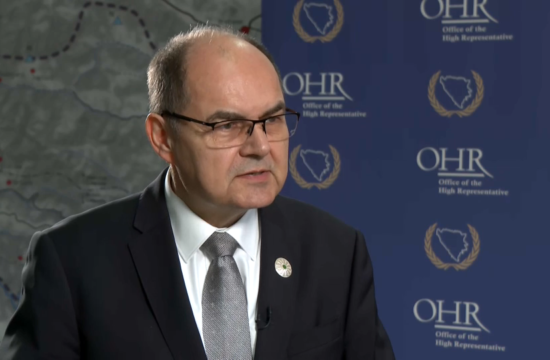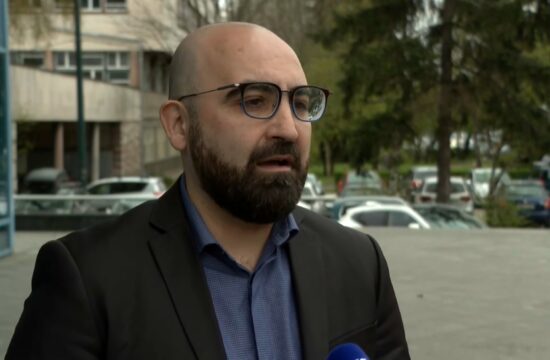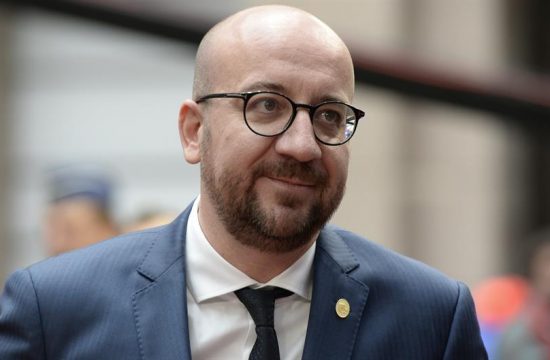Bosnia must implement its election results as soon as possible, as well as change its election law, US State Department top official Matthew Palmer told media on Tuesday.
Bosnia has for two years not managed to find a way to change its Election Law, although it was declared unconstitutional in 2016. The issue has been raised by political parties, most notably the ethnic-oriented Croat Democratic Union (HDZ), whose officials have said that without the changes, there are no conditions for forming the governments in Bosnia after the October General Election.
The US State Department Deputy Assistant Secretary at the Bureau of European and Eurasian Affairs said that those reforms cannot be imposed by the international community, but that they have to be proposed and implemented by Bosnia’s officials, as they need to have legitimacy.
For this, it is essential that Bosnian politicians find a compromise, he said.
“Tensions are normal in a democratic society. Through them, through negotiations and achieving compromises, policies are born,” Palmer said, adding that the US will help with this process and support reforms, but that “we are not here to dictate.”
Citizens of all Western Balkan countries still want EU and NATO membership, and although the process is difficult and lengthy, it has no alternative, he said. The US will support the membership of all regional countries in the EU, and also in NATO, as all of them, except for Serbia, have expressed an interest in joining the alliance.
Palmer said that the name deal between Macedonia and Greece is a positive regional development and that there is no reason for why Macedonia could in some 18 months not become the 30th full member of NATO after the deal is implemented.
The deal will open the doors of the EU to Macedonia and it can be expected that negotiations about it will already start in June 2019, he said.
Albania might also begin negotiating membership in the Union as well at that time, he added.
The US strongly supports the EU-facilitated negotiation process between Serbia and Kosovo, Palmer said, adding that his country wants to see relations between the two countries normalise, which would open the doors of the EU to both countries.
“That would contribute to the security situation in the Western Balkans. With such an agreement, stability and peace in the entire region would be promoted,” he said.
Palmer, however, criticised Kosovo’s authorities for introducing a 100 per cent tax on Bosnian and Serbian imports.
Pristina raised the tariffs for goods from those two countries as they are the only regional states that have not recognised Kosovo as an independent country.
Palmer called upon Kosovo authorities to retract the decision, saying that it represents an obstruction to continuing the dialogue between Serbia and Kosovo.
Serbia does not stand against NATO, Palmer said, explaining that the country wants to have a productive relationship with the alliance. Its cooperation with NATO is even better than Bosnia’s currently, he said, as Bosnia still has a lot of work to do before it achieves that level of cooperation with the alliance.
Palmer also touched upon a recent Resolution on Serbia, which was adopted in the European Parliament, and which asks the country to admit that a genocide was committed in the Bosnian town of Srebrenica in 1995.
The facts surrounding that genocide are well established and were confirmed by all relevant international bodies, he said.
Serbia must face its past in order to move toward the future, Palmer said, calling upon the regional public to accept those facts.
The diplomat also spoke about Russia, saying that the state should not condition any country on how it will behave in regard to Euro-Atlantic integrations.
Russia’s efforts to undermine any effort by any country to join NATO and the EU is destabilising and detrimental to regional peace and stability, he said.
“The US is not telling countries of the Western Balkans what to do, but our vision of the Balkans is much more compact in regard to what those countries have chosen themselves,” he said, adding that “ambitions for EU and NATO membership is a strong inciter for change.”
Such a US stance regarding Western Balkan countries will not change and that is a continuous policy of that country, he said, adding that US ambassadors are implementing it in other states, regardless of whether the administration has changed.
The current Chairman of Bosnia’s tripartite Presidency, Bosnian Serb Milorad Dodik, has been blacklisted by the US.
The US will, however, be committed to cooperating with all members of the Presidency, including Dodik, Palmer said.
“He is still under US sanctions as him becoming a member of the Presidency of Bosnia and Herzegovina is not one of the criteria for releasing him from the sanctions,” Palmer said. “Dodik knows what is expected of him for the sanctions to be removed, and we would like to see him going in that direction.”
The US introduced the sanctions against the Bosnian Serb leader because of his activities which breach the 1995 Dayton Peace Agreement, which ended the war in Bosnia, Palmer pointed out.
Dodik has to show that he is committed to the territorial integrity of Bosnia and that he does not have secessionist aspirations, he said.
Dodik, who has been elected to the Presidency by voters in the Bosnian Serb semi-autonomous region of the country, Republika Srpska (RS), has been advocating for the RS to secede and join neighbouring Serbia for years.
Palmer said that the US introduced the sanctions as support for the implementation of the Dayton Agreement.
The sanctions were efficient, in the sense of achieving a change in the political dynamics and direction and for resisting threats and secessionism which was detrimental to stability in Bosnia, he said.
The US also sanctioned a top official from Dodik’s Alliance of Independent Social Democrats (SNSD), Nikola Spiric.
Palmer said that those sanctions came about as an answer to corruption, which he said had a corrosive influence and is detrimental to public trust in government representatives.
All those moves, Palmer said, are proof that the US supports peace and stability in Western Balkan countries.




